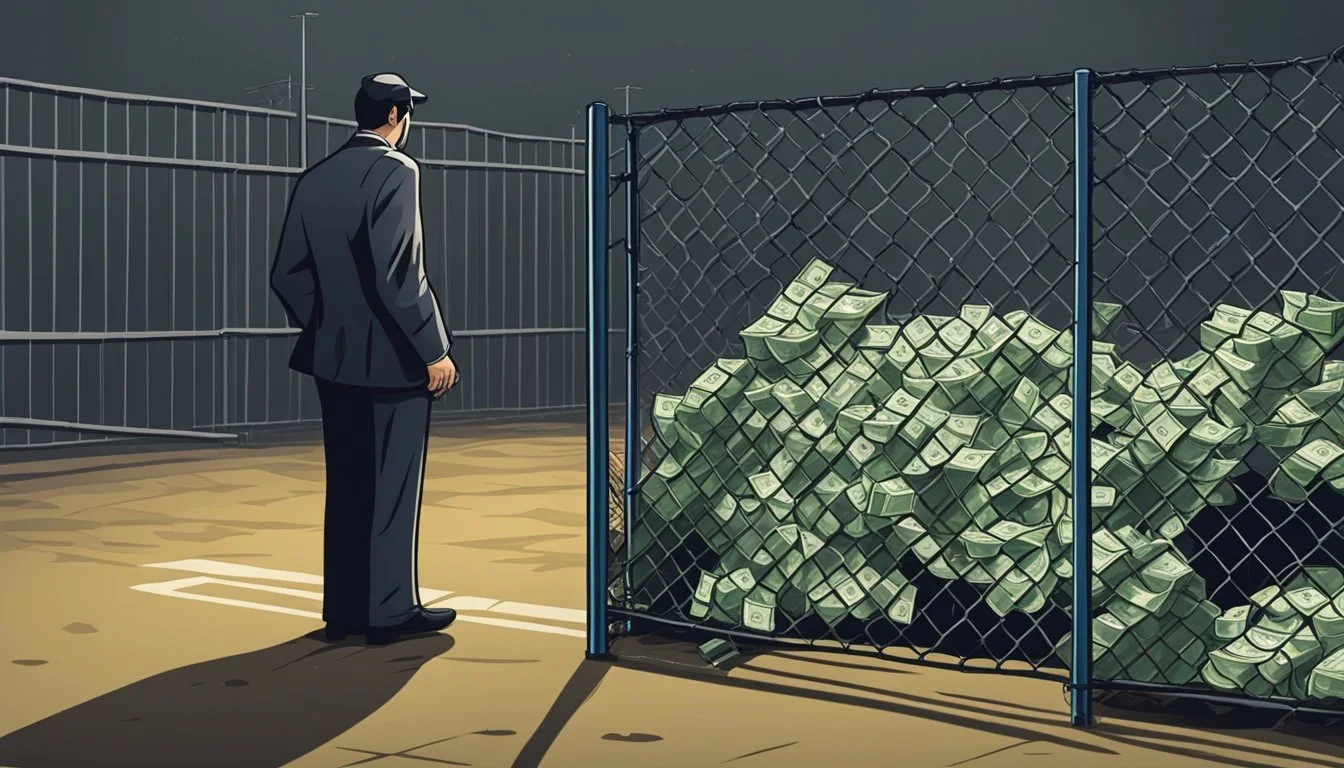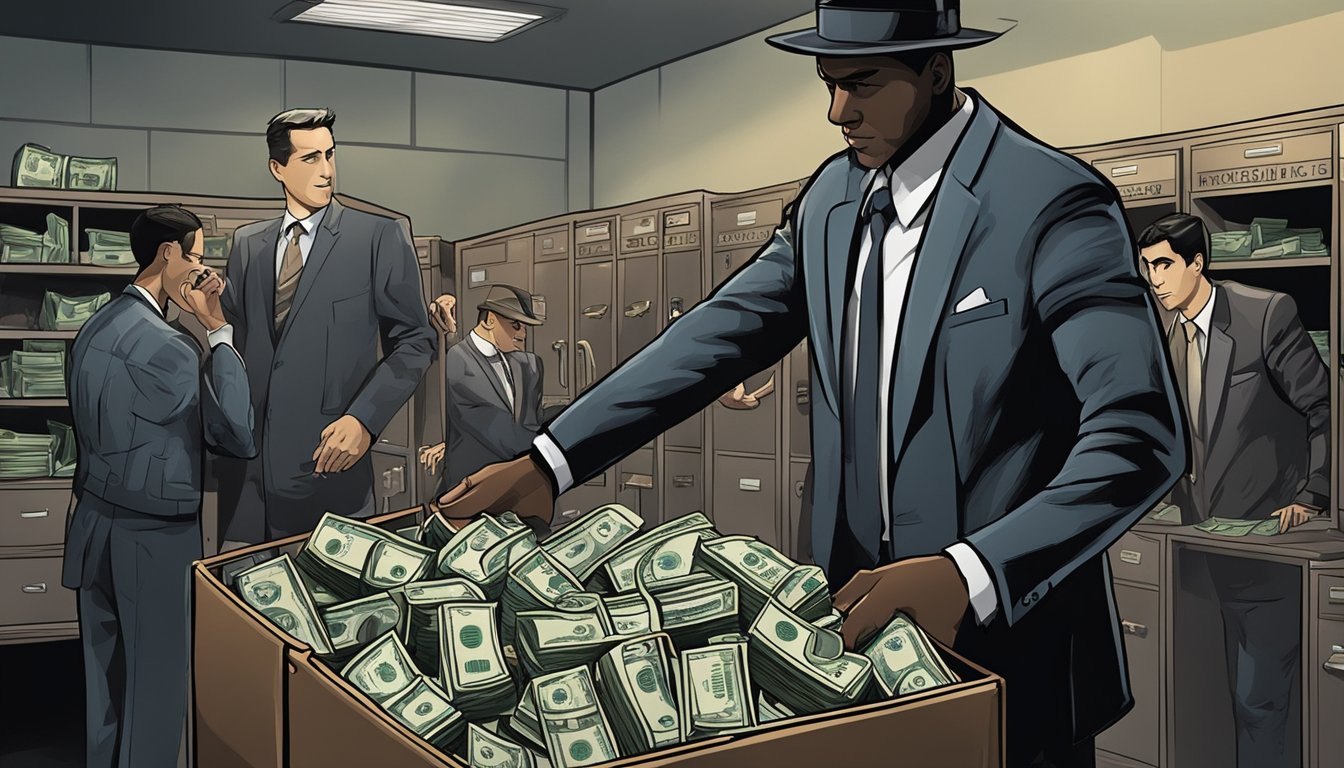9 Gripping Documentaries on Notorious Sports Scandals and Match-Fixing
Exposing Corruption in Athletics
Sports scandals have captivated audiences for decades, revealing the dark underbelly of competitive athletics. From doping and match-fixing to illegal betting and criminal activities, these controversies expose the lengths some will go to for victory or financial gain.
Documentaries exploring notorious sports scandals offer viewers an in-depth look at the motivations, consequences, and wider impact of these events. By featuring firsthand accounts from athletes, coaches, officials, and investigators, these films provide unique insights into the complex world of professional sports and the ethical dilemmas faced by those involved. Through compelling storytelling and expert analysis, they shed light on systemic issues within various sports and prompt important discussions about integrity, fairness, and the true spirit of competition.
1) 'The Two Escobars'
'The Two Escobars' is a riveting documentary that explores the intertwined fates of two Colombian figures: soccer player Andrés Escobar and drug lord Pablo Escobar. The film delves into the complex relationship between soccer, crime, and nationalism in 1990s Colombia.
Directed by Jeff and Michael Zimbalist, the documentary examines how Pablo Escobar's drug money fueled the Colombian soccer scene, leading to what became known as "Narco-soccer." This influx of illicit funds propelled Colombian teams to new heights of success.
Andrés Escobar, the captain of Nacional, was a beloved figure in Colombian soccer. His skill and leadership on the field made him a national hero. In contrast, Pablo Escobar was the notorious leader of the Medellín cartel, wielding immense power and influence.
The film draws parallels between these two men from different backgrounds who shared a passion for soccer. It explores their rise to prominence and their tragic ends, both falling victim to the violence that plagued Colombia during this tumultuous period.
Through interviews and archival footage, 'The Two Escobars' paints a compelling picture of a nation where sports and crime became inextricably linked. The documentary offers a unique perspective on a dark chapter in Colombian history and its impact on the world of soccer.
2) The Armstrong Lie
"The Armstrong Lie" is a compelling documentary directed by Alex Gibney that explores the downfall of cycling champion Lance Armstrong. Originally intended to chronicle Armstrong's 2009 comeback, the film took an unexpected turn when the doping scandal broke.
Gibney gained unprecedented access to Armstrong and his inner circle during filming. This allowed him to capture intimate moments and candid interviews that shed light on the athlete's complex persona.
The documentary examines Armstrong's rise to fame, his battle with cancer, and his subsequent cycling victories. It then delves into the elaborate doping scheme that helped him achieve his unprecedented seven Tour de France wins.
Gibney's film skillfully weaves together archival footage, interviews with former teammates, and conversations with Armstrong himself. It offers a nuanced look at the athlete's fall from grace and the impact of his deception on the sport of cycling.
"The Armstrong Lie" presents a balanced view of its subject, allowing viewers to draw their own conclusions about Armstrong's actions and motivations. The film serves as a cautionary tale about the pressures of fame and the consequences of maintaining a public lie.
3) Icarus
Icarus is a groundbreaking documentary that uncovers one of the most significant sports scandals in history. Directed by Bryan Fogel, the film initially set out to explore doping in cycling through a personal experiment.
However, Fogel's journey took an unexpected turn when he connected with Dr. Grigory Rodchenkov, a Russian scientist. This relationship led to the exposure of Russia's state-sponsored doping program.
The documentary provides an in-depth look at the elaborate system used to enhance athlete performance and evade detection. It reveals how the program operated at the highest levels of Russian sports and government.
Icarus gained international attention for its role in bringing this scandal to light. The film's revelations had far-reaching consequences for Russian sports, leading to investigations and sanctions.
The documentary combines personal narrative with investigative journalism, creating a compelling and informative viewing experience. It offers viewers a rare glimpse into the world of performance-enhancing drugs in elite sports.
Icarus received critical acclaim and won several awards, including the Academy Award for Best Documentary Feature in 2018. The film continues to be cited in discussions about doping in sports and international competition integrity.
4) Bad Sport
"Bad Sport" is a Netflix docuseries that explores the intersection of true crime and sports. The show delves into various global controversies and scandals within the sporting world.
Each episode focuses on a different case, featuring firsthand accounts from individuals directly involved in the events. The series covers a range of topics, including basketball point-shaving, match-fixing, and even a drug-trafficking race-car driver.
One notable episode examines the 1990s match-fixing scandal involving Stevin 'Hedake' Smith in college basketball. The series uses a combination of archival footage, interviews, and re-enactments to present a comprehensive view of each scandal.
"Bad Sport" offers viewers an in-depth look at the darker side of sports, revealing the extent of corruption that can exist in various athletic disciplines. The show's producers include Tim Wardle, known for "Three Identical Strangers," and Adam Hawkins of "Don't F**k with Cats" fame.
This series adds to Netflix's growing collection of sports documentaries, providing audiences with captivating insights into some of the most shocking scandals in sports history.
5) The Great Energy Heist
"The Great Energy Heist" is a riveting documentary that exposes a massive corruption scandal in the energy sector. It uncovers how high-ranking officials and corporate executives conspired to manipulate energy markets for personal gain.
The film meticulously traces the origins of the scheme, revealing how key players exploited loopholes in regulatory systems. It showcases the intricate web of deceit that allowed them to artificially inflate energy prices, resulting in billions of dollars in illicit profits.
Through interviews with whistleblowers and investigative journalists, the documentary paints a clear picture of the far-reaching consequences. Consumers faced skyrocketing utility bills, while entire communities grappled with rolling blackouts.
The filmmakers skillfully present complex financial maneuvers in an accessible manner. They use compelling visual aids to illustrate the flow of money and the structure of the conspiracy.
"The Great Energy Heist" serves as a stark reminder of the importance of oversight in critical industries. It highlights the need for robust checks and balances to prevent such large-scale fraud from occurring in the future.
6) The Spy Who Fooled the World
"The Spy Who Fooled the World" is a BBC Panorama documentary that examines the flawed intelligence leading up to the Iraq War. Directed by Mike Rudin, the film features investigative journalist Peter Taylor as he uncovers the deceptive tactics used to justify the 2003 invasion.
The documentary delves into the controversial intelligence reports that claimed Iraq possessed weapons of mass destruction. It exposes how fabricated evidence and misinformation were presented as facts to build a case for war.
Central to the story is an Iraqi defector codenamed "Curveball," whose false claims about mobile biological weapons labs were used to support the invasion. The film reveals how intelligence agencies failed to properly vet this information.
"The Spy Who Fooled the World" provides a critical look at the intelligence gathering process and decision-making that led to one of the most significant geopolitical events of the 21st century. It serves as a cautionary tale about the consequences of relying on unverified intelligence in matters of national security.
7) Betrayal at Attica
The 2021 documentary "Betrayal at Attica" sheds light on the tragic events of September 13, 1971, at Attica Prison in New York. Directed by Michael J. Hull, the film examines one of the bloodiest days in American history.
The documentary explores the uprising at Attica Prison and the subsequent violent response by the state. It reveals how 39 people were killed and hundreds more injured when authorities attempted to retake control of the facility.
"Betrayal at Attica" features interviews with survivors and delves into previously hidden evidence. The film exposes the cover-up that followed the incident and challenges the official narrative presented by the state.
Elizabeth Fink, attorney for the Attica Brothers Legal Defense, provides crucial insights in the documentary. Her final interview before her passing offers valuable context and sheds light on evidence that was concealed by New York authorities.
The film is available on HBO Max and has garnered attention for its unflinching look at this dark chapter in American history. It serves as a powerful examination of state violence and its long-lasting consequences.
8) Soccer's Lost Boys
"Soccer's Lost Boys" explores the dark side of African football's talent pipeline. This documentary sheds light on young players' dreams of stardom and the harsh realities they often face.
The film follows aspiring footballers from West Africa as they navigate a system fraught with exploitation. It reveals how unscrupulous agents lure talented youth with promises of European contracts.
Many boys find themselves abandoned in foreign countries, far from home and support networks. The documentary exposes the human cost of this predatory practice in the football industry.
It also highlights the lack of regulation and oversight that allows such abuses to continue. Viewers gain insight into the economic pressures and cultural factors driving this phenomenon.
The filmmakers interview players, families, and industry insiders to present a comprehensive picture. They balance personal stories with broader analysis of the systemic issues at play.
"Soccer's Lost Boys" serves as a powerful call to action for reform in youth football recruitment. It challenges viewers to consider the ethical implications of the global sports market.
9) The Price of Gold
"The Price of Gold" is a gripping documentary that revisits one of the most infamous scandals in Olympic history. The film focuses on the rivalry between figure skaters Nancy Kerrigan and Tonya Harding leading up to the 1994 Winter Olympics in Lillehammer.
The documentary explores the events surrounding the attack on Kerrigan, which occurred just weeks before the Games. It delves into the aftermath of the incident and its impact on both skaters' careers and personal lives.
Through interviews and archival footage, the film provides a comprehensive look at the scandal that captivated the world. It examines the contrasting backgrounds and personalities of Kerrigan and Harding, offering insights into their motivations and experiences.
"The Price of Gold" sheds light on the intense pressure faced by athletes competing at the highest levels of their sport. It raises questions about the cost of ambition and the lengths some may go to achieve success.
The documentary offers a nuanced perspective on a story that was often sensationalized in the media. It invites viewers to reconsider their preconceptions about the events and the individuals involved.
Background on Sports Scandals
Sports scandals have rocked the athletic world for decades, shaking fan trust and tarnishing reputations. These controversies span match-fixing, doping, corruption, and other unethical practices across professional and amateur competitions.
Historical Context
The first major sports scandal erupted in 1919 with the Black Sox Scandal in baseball. Eight Chicago White Sox players were accused of intentionally losing the World Series in exchange for money from gamblers. This event led to stricter gambling regulations in baseball.
In the 1980s, point-shaving scandals hit college basketball. Players from Boston College and Tulane University were caught manipulating game scores to benefit gamblers. These incidents highlighted the vulnerability of amateur athletes to financial temptation.
The 1990s saw widespread doping allegations in cycling and track and field. The Ben Johnson scandal at the 1988 Olympics and Lance Armstrong's fall from grace in cycling became watershed moments in anti-doping efforts.
Impact on the Sports Industry
Sports scandals have far-reaching consequences for athletes, teams, and governing bodies. Financial losses can be substantial, with sponsors withdrawing support and fans losing interest. The 1994 figure skating scandal involving Tonya Harding and Nancy Kerrigan briefly boosted viewership but ultimately damaged the sport's reputation.
Governing bodies often implement stricter regulations in response to scandals. The creation of the World Anti-Doping Agency in 1999 was a direct result of widespread doping in various sports. Match-fixing scandals in cricket led to the formation of anti-corruption units within sports organizations.
Public trust in sports can erode, leading to decreased attendance and viewership. The steroid era in baseball saw a temporary spike in interest but later resulted in fan disillusionment and questioning of records set during that period.
Key Figures Involved in Match-Fixing
Match-fixing scandals have shaken the sports world, implicating both individual athletes and influential organizations. These cases have exposed the dark underbelly of competitive sports and raised serious questions about integrity in athletics.
Notorious Athletes
Nikolay Davydenko, a former professional tennis player, was at the center of a high-profile match-fixing scandal in 2007. Suspicions arose when an unusually large amount of money was bet against him during a match he ultimately lost.
In football, several players have been implicated in match-fixing schemes. Dan Tan, a Singaporean businessman, was identified as a key figure in a global football match-fixing network that operated across multiple countries.
Cricket has also seen its share of scandals. Pakistani cricketers Salman Butt, Mohammad Asif, and Mohammad Amir were banned for spot-fixing during a 2010 Test match against England.
Influential Organizations
Criminal syndicates have played a significant role in orchestrating match-fixing operations. The Lucchese crime family was implicated in a point-shaving scandal involving Boston College basketball in the 1970s.
Sports betting companies have come under scrutiny for their potential involvement in match-fixing. Some organizations have been accused of failing to report suspicious betting patterns.
International sports governing bodies like FIFA and the International Tennis Federation have established integrity units to combat match-fixing. These units investigate allegations and work to prevent corruption in their respective sports.







